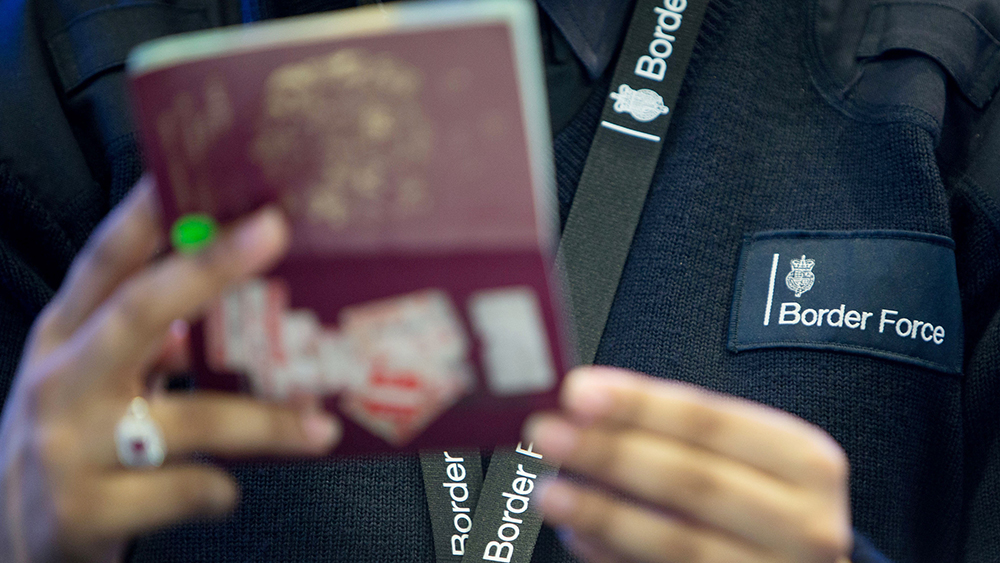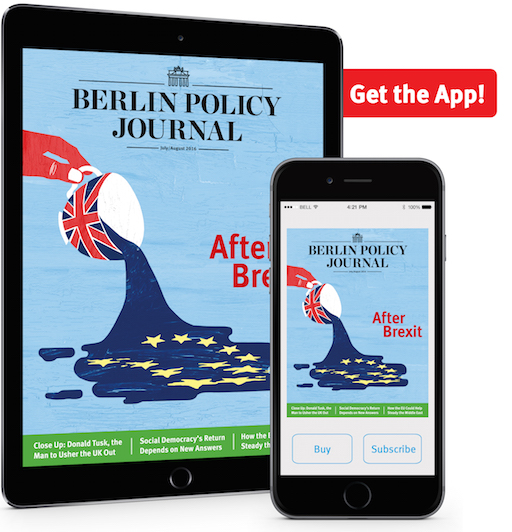European migration policy has been roundly criticized lately for being too illiberal. While this is unfair, there is room for improve- ment in the EUʼs dealing with refugees and migrants.
This March, the EU agreed to a deal with Turkey under which Ankara takes back refugees from the Greek islands and better regulates their onward movement to Europe. Commentators wrote it off as pointless, saying Syrians, Iraqis, and Afghans would simply be pushed to a far more dangerous path to the EU via Libya. There has indeed been a rise in the numbers coming through Libya, but the reality is more complex. Syrians, Iraqis, and Afghans are just a trace element there, while the biggest numbers come from across Africa.
The sheer range of nationalities passing though Libya is just the latest sign that something systemic is wrong in the world. Only half of all asylum seekers to the EU last year came from Syria, Iraq, or Afghanistan. Nigeria was the number one source country for Italy; Sudan for France; Eritrea for the UK; and Russia for Poland. One analyst counted more than a hundred nationalities registered in Lesbos last year.
This exodus constitutes a souring of globalization and poses a challenge to the liberal Western order. In 1991, when barriers and buffers collapsed, mass migration threatened to overwhelm fragile state-building processes from Eastern Europe to Africa. Western states took a gamble, using trade and capital flows to give people reasons to stay home. This promise of equitable global development has now seemingly run its course.
The West’s attempt to create a massive crossborder economy was always going to be hard to combine with national state-building. Many liberals were naive to believe that international trade and investment would automatically spread democracy and its institutions. With their plans now in tatters, it is time for a rethink on European migration policy.
The Need to Intervene
In the refugee debate, Europe’s voters and politicians are putting their fears before reason. In the case of liberals, they see all border measures as unjust and EU overseas interventions as “burden-shifting.” Europe as “the lone beacon of liberalism” is just the other side of the coin of “Fortress Europe.” Both ideas reflect pessimism about the EU’s ability to positively influence the chaos beyond its borders.
What drives liberals to test the EU’s moral credentials by making it stand as a beacon in a collapsing international order? It comes down to a reluctance to tackle the root causes of migration: the West has a poor recent track record of state-building, and interventions in Afghanistan, Iraq, and Libya seem nothing short of hubris in hindsight. These interventions have certainly contributed to the refugee crisis.
Policies to address the causes of irregular migration – interventions, trade, aid – may have been flawed and messy, but they were also necessary. Moreover, the EU’s approach of managing migration from its neighbors was essentially constructive. The EU has tried to build up neighboring countries and regions, then gradually reduce barriers with them. That is what the EU was doing when it enlarged eastwards or removed visa restrictions for the Western Balkans.
Starting from the Bottom Up
Happily, the overseas interventions required to address migration do not involve classic state-building. Certainly saving Libya or Syria feature on the EU’s agenda. But what is required to manage migration is an effort at the micro-level. Take the people-smuggling networks across the EU’s neighborhood. We talk about “king pins” and “crime bosses.” But the networks are in fact mostly run by individuals making a quick buck. If only it were a case of eliminating “Mr. Big.”
Syrians and Afghans often speak highly of the people who smuggle them across borders – except when being interviewed by European border guards. This is because the smuggling networks are increasingly controlled from diaspora groups in the EU and family members outside. By contrast, the refugees speak badly of the Istanbul taxi drivers who know the safe houses and are notorious for overcharging Syrians.
Migrants are using the networks designed to escape development failures. Syrians flee in no small part because of poor urbanization. They coordinate themselves via smartphone. If they move on from Turkey, it is in search of education for their children. As for those arriving in the EU, sixty percent rely on classic travel agents and just two percent on the EU’s attempts to engage on social media.
Why are we not looking for bottom-up solutions across the Middle East? Aid workers on the front line in northern Syria complain that large humanitarian organizations are “withdrawing from the world.” Big organizations, says one aid worker, subcontract the spadework to smaller ones like his, meaning he is the one teaching the law of war in rebel-held zones or deciding whether to help refugees cross borders. As they divorce themselves from reality, the big organizations take the moral high ground in Brussels and Berlin, but they can no longer convey information from the ground up.
Four Observations
If liberals are to rediscover their sense of reality, they may well have to confront some unpalatable political ideas. When Bob Smith and Bob Wilson created their famous 12-step plan to sobriety, they were drawing from their own experience as reformed alcoholics. Consider what follows as talking points of a political rehabilitation drawn from bitter experience.
Europe must externalize the solution. Today, just as in the 1990s, the main locus of the refugee crisis is beyond the EU’s borders. The real global crisis is not one of mobility but immobility: the vast majority of people displaced by violence are internally displaced, unable to cross borders. The majority of those who do leave their country are sitting close to the border. The UK Government Science Office acknowledged this predicament in 2011 when trying to predict numbers of climate refugees: the real problem, it came to realize, would not be mass migration but “trapped populations.”
Refugees are not helpless. OECD data suggest that the people who flee to Europe are often resilient, educated, and trained. But as they enter the EU, they are suddenly made to fit the European conception of what a refugee ought to be. Why do European societies require asylum seekers to be helpless? Today, migrants daily prove the reverse is true: those who move are often safest, have the best job opportunities, and can “vote with their feet.” A liberal Europe that is unable to make a sedentary lifestyle sustainable finds itself trying to make the mobile helpless.
Let’s be more ambitious. Many cling to the belief that all EU migration policy is illiberal, but they cannot offer a clear alternative to it. That is not to deny that some reform proposals do mark a clear liberal alternative – for example giving Frontex a search-and-rescue mandate or creating so-called Nansen passports for people to come to Europe to make a claim for refuge. When these ideas fail to gain traction, their supporters grumble it is because they are too ambitious. The reverse is true: Europe’s politicians have lost a whole liberal toolbox for dealing with migration, one which allowed them to affect the root causes abroad. As a result, the EU is left at the mercy of external forces.
Liberals are fueling populism. Liberals, like populists, are using refugees as metaphors in an emotional debate of their own about the need for a progressive Europe. When liberals cite Europe’s “demographic crisis” as grounds to welcome refugees, they are siding with heavily globalized urban hubs and adopting arguments that reduce people to mere economic or breeding units. This is exactly what populists fear.
Lessons of History
In the early 1990s, the EU experienced the last major shift in global power. At the time, there were fears of a massive, permanent flow of migration. Populists called on the EU to tear up its plans for a passport-free travel area (“Schengen”) and roll back refugee law. Despite the panic, the flows never materialized.
The historical lesson is not that such fears are always unfounded. Rather, it showed how necessary emergency border controls were to reestablish the rule of law and liberal institutions and to usher in a shift in liberal policy.
Those emergency restrictions have been the first priority in this crisis, too. But liberals must see that just as in 1991, European migration policy is a vacuum waiting to be filled – and that they have the scope to propose ambitious long-term reforms. After all, the old European policy of trade liberalization and state-building rested on the pledge that goods, capital, jobs, and democracy would come to the developing world, so people there did not have to move in search of them. It has not worked out that way, and people are on the move. That means the world needs new ways of matching up people and things across borders. Imagine the globalization of the sharing economy!
Away from the emotive debates about the Turkey deal, EU policy is quietly cohering around four principles: helping displaced people help themselves; giving people opportunities as close to home as possible; engaging with the more progressive of the West’s “rivals”; and, creating genuine political partnerships with poorer states.
There is plenty of potential there for a truly liberal approach.
NB. The author’s recent study “People on the Move. The New Global (Dis)Order” can be found here.
Read more in the Berlin Policy Journal App – July/August 2016 issue.








